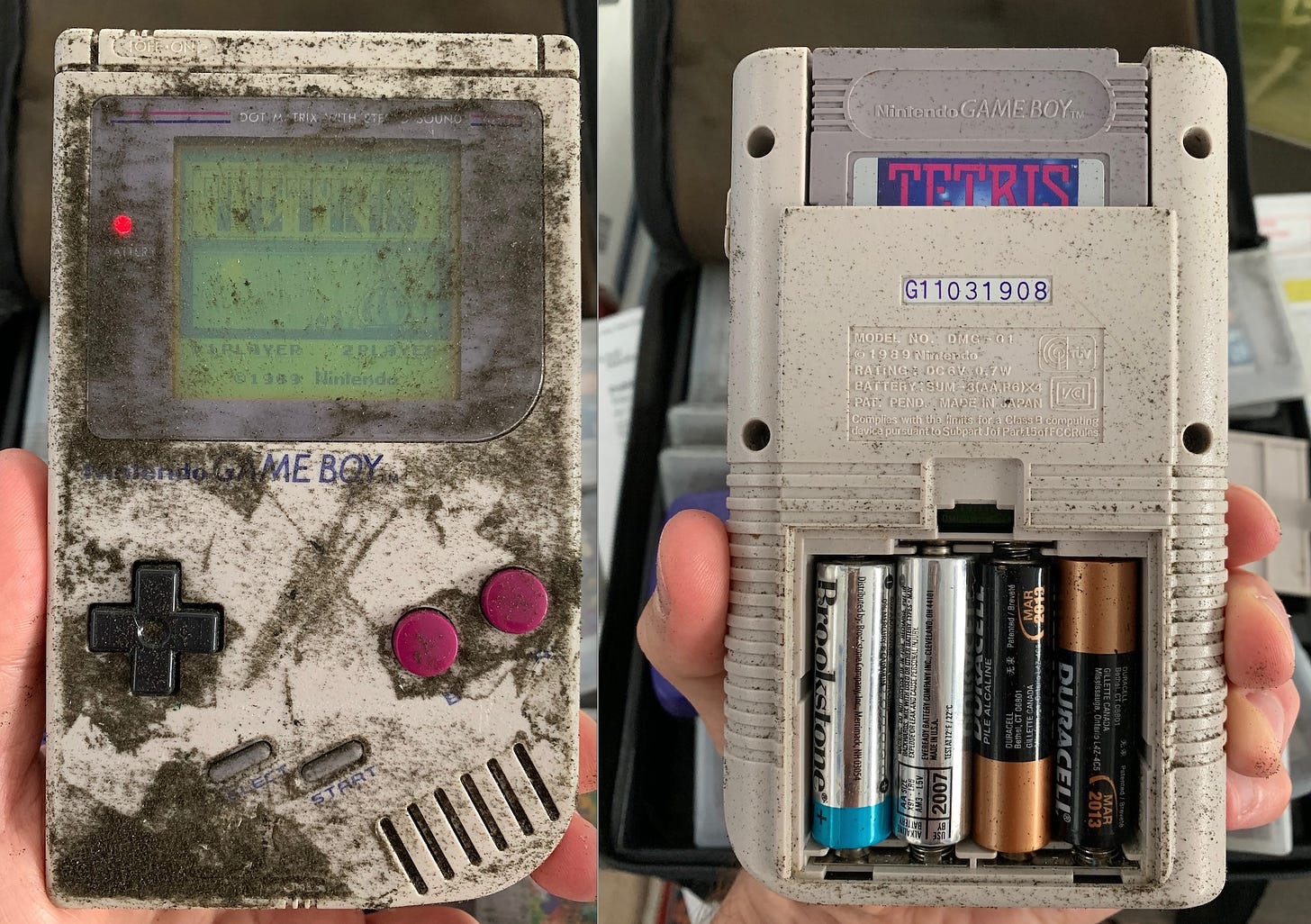“No tool is omnicompetent. There is no such thing as a master-key that will unlock all doors." ~ Arnold Toynbee, A Study of History
Welcome to Range Widely, the new newsletter for generalists. I'm thrilled to have you here, and if you’d like to get emails from me, subscribe!
*******************************************************************
I’d like to introduce you to this newsletter with a quick story of innovation — one that you’ll recognize, just maybe not at first:
The origin story you never hear
Gunpei Yokoi didn’t score well on his electronics exams in college. So while many of his peers left for big corporations in gleaming Tokyo skyscrapers, he settled for a job as a machine maintenance worker at a playing card company in Kyoto.
Since the late nineteenth century, the company had been sustained by hanafuda, playing cards with flowers on them. But times were changing, quickly. The business needed to diversify to survive.
So when, one day, the desperate company president found a bored Yokoi crisscrossing pieces of wood to fashion an extendable arm (which he could use to lazily retrieve distant objects), he called Yokoi into his office. “I thought I would be scolded,” Yokoi recalled. Instead, the president told him they would take his contraption to market immediately, as a toy for kids. The “Ultra Hand” was a hit, and allowed the company to pay off a chunk of its debt. That was the end of Yokoi’s maintenance career.
The president assigned him to develop more toys. Electric and electronic toys were all the rage, but how could Yokoi, the subpar engineering student, compete? One day, in 1977, while riding the bullet train back home from Tokyo, Yokoi awoke from a nap to see a salaryman playing with a calculator to relieve the boredom of his commute. What if, Yokoi wondered, there was a game small enough that an adult could play it discreetly while commuting, using only their thumbs?
In 1980, the company released the “Game & Watch” (the screen also displayed time), with high hopes for one hundred thousand sales. Over the next decade, Game & Watch sold 43.4 million units. The little company that began life making flower playing cards out of a wooden storefront in the nineteenth century got a whole lot bigger. You may have heard of it — it’s called Nintendo.
What serial innovators have in common
Yokoi went on to create the successor to the Game & Watch, the Game Boy — the best selling console of the twentieth century. Later in his career, he reflected on his surprising path from machine maintenance to lead inventor. Yokoi’s personal hobbies spanned piano, ballroom dancing, and choir, to skin diving, model trains, working on cars, and — most of all — monozukuri: “thing making”; he was an avid tinkerer. “I don’t have any particular specialist skills,” Yokoi said. “I have a sort of vague knowledge of everything.” That doesn’t sound like promising material for a technological innovator, does it?
But consider the work of professor Abbie Griffin, who studies so-called “serial innovators,” people who make repeated creative contributions. Here are some of the ways that she and her colleagues describe those individuals: they have “additional knowledge from peripheral domains”; they “repurpose what is already available”; they have an “ability to connect disparate pieces of information in new ways”; they “synthesize information from many different sources”; “they appear to flit among ideas”; they have a “broad range of interests”; “they read more (and more broadly) and have a wider range of outside interests” than their peers; they “need to learn across multiple domains.”
Get the idea? They range widely.
I learned about Yokoi while reporting my 2019 New York Times best seller, Range: Why Generalists Triumph in a Specialized World. Researching athletes, artists, musicians, inventors, forecasters, scientists, and more, I found that broad interests and diverse experience were hallmarks of the typical path to fulfillment and achievement. Compared to other scientists, for instance, Nobel laureates are at least twenty-two times more likely to have a hobby (usually artistic) unrelated to their work. They also tend to do more multidisciplinary work and progress more slowly early in their careers — a pattern mirrored by elite athletes, who usually go through a “sampling period” of diverse experience, and delay narrow specialization.
Paths that may look, at first, slow and inefficient, often confer enormous benefits down the road. Yokoi’s “vague knowledge of everything” coalesced in an innovation strategy he called “lateral thinking with withered technology” — combining older technologies in new ways. With increasing ease of access to information, he felt, there would be more and more opportunity for people with broad interests.
Researching and writing Range changed how I think about my own personal and professional development. Not that I minded changing directions — I went from living in a tent in the Arctic to writing for Sports Illustrated — but I was more embarrassed than proud of my path. I often tried to change the subject if my professional trajectory came up, and I began to worry that I was a job-commitment-phobic drifter.
Researching Range, I realized the scientific literature on how people build skill, improve their thinking, and enhance their creativity told a different story. I stopped apologizing for my own mental meandering, and started embracing it.
So: what does that have to do with this newsletter?
My mission, for me and you
Arturo Casadevall, a Johns Hopkins professor and one of the most influential immunologists in the world, once shared with me the advice he gives every colleague: “Read something outside your field every day.” Their typical response? “ ‘Well, I don’t have time to read outside my field’,” he recounted. “I say, ‘No, you do have time, it’s far more important.’ Your world becomes a bigger world, and maybe there’s a moment in which you make connections.”
I’m writing this newsletter because I love to expand my own range, and encounter ideas that aren’t otherwise part of my daily work. And sometimes, there’s a moment in which I make connections that help me see the world in a new way. I hope it will help you do the same. I hope that, perhaps, you will even find an interest you didn’t know you had.
Each week, I’ll help you think about something outside of your field. It might be a surprising scientific finding about breaking bad habits; a look at why one of the most successful writers in the world would abandon her native language; or a tool for quickly smoking out nonsense in the news. Some weeks, it will be more topical, like my conversation with an Olympic gold medalist (prompted by Simone Biles) about how certain mental tools that Olympians employ in competition can backfire in other aspects of life.
I hope you’ll share some of your thoughts and stories with me, since I plan to share some with you.
Speaking of: while I was researching Yokoi and Nintendo, I went and found my old Game Boy in my parents’ basement. As you can see below, it’s seen better days. Fortunately, part of Yokoi’s plan was to make up for old tech (the Game Boy’s processor was a decade old!) with things users really cared about: price, durability, portability, affordability, game selection, and battery life.
My Game Boy’s beauty contest days may be behind it, but as soon as I found it, I turned it on and played Tetris — especially impressive, because when I flipped it over, I saw that the batteries had expired in 2007 and 2013!
Game Boy, the digital version of The Giving Tree, apparently.
Play along at home
Have you read and been fascinated by something outside your field lately? Share it in the comments! Better yet, dredge up your old Game Boy and let me know if it’s still working. And how old the batteries are, so I know if I can claim the record.
Here you can see, comment on, and share every newsletter as a post, and soon I’ll host live chats and invite others for live interviews so that we can all engage in real time. Thank you for reading, and I’m looking forward to ranging widely together.
Until next week….
David







Hi David, This woman I follow on tiktok has been doing a lot of videos discussing Range as she's reading it. You might get a kick out of her videos : https://www.tiktok.com/@miriam_tinny/video/7248364267047603502 (also can totally appreciate if you don't want to try to keep up with all the platforms!)